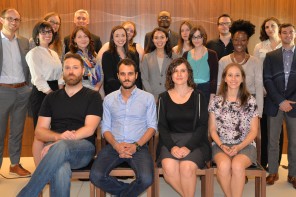Starting a new program is always a little nerve-wracking. You see a need and want to fill it, but there are a lot of variables. Clearly, the topic of careers for humanities PhDs is hot, right alongside the interrelated issues of time to degree, labor conditions for contingent faculty members, and the place of the humanities in the public sphere. But even with all the buzz, no one at the MLA was quite sure how much interest we were going to get when we opened the application process for our 2015–16 New York City–based Connected Academics proseminar. I suggested we might receive a hundred applications for the twenty available spots and was gently warned that this was probably too optimistic.
As it turns out, we were all way off base. By the time applications closed at midnight on 15 June, we had received 245 applications.
This astonished us, but in hindsight it probably shouldn’t have. I know from personal experience that the question of the post-PhD career can cause deep anxiety. Much of this anxiety stems from pragmatic concerns, such as, Will I have to hang my PhD diploma on the wall of my childhood bedroom? Is it even remotely feasible for my partner and me to find positions within driving distance of each other? Will I ever live in one place long enough to think about buying a house? Most people complete their PhDs somewhere between their late twenties and mid thirties, and that is a time of shifting priorities. What matters to someone most when they enter a program may not matter nearly as much when they finish, especially if along the way they’ve acquired a spouse, a kid, or an ailing parent. Pragmatic concerns that seemed very distant at twenty-two can seem pressing at twenty-eight and be of grave importance by thirty-five.
The applications we received reflected these pragmatic concerns, as well as, in many cases, the shifting priorities that made a tenure-track career seem suddenly much less attractive. But many of the applications also reflected a sense of optimism and idealism about a future career, as yet undefined, that would allow the applicants to put their training to good use and contribute to society. The applications reflected a powerful belief in the humanities and in humanistic thought and a conviction that those who decided to pursue a connected career were not abandoning their ideals—far from it. Many applicants spoke passionately about work they have already done in the public humanities, in secondary education, in the not-for-profit sector, and in the corporate world, as well as about the need for professionally trained humanists in all of these areas. Many of them talked about not only the skills they would bring to the table but also the content of their research and how it might be applied outside the academy.
Clearly, the pragmatic concerns I mention above are only the tip of the iceberg; there are also deep philosophical issues at stake in this conversation, which the proseminar applicants were well aware of. For them, the personal and the philosophical were one and the same. There was no separating the desire to alleviate pragmatic concerns from the desire to find ways to put humanistic training to work for a greater good. All the applicants wanted help with how to do this—how to find the path that would alleviate both their personal and their philosophical concerns, that would give them both the means to live a life and a purpose for living it.
This isn’t an easy issue to address. The MLA’s recent survey of 2,214 language and literature PhDs shows that there isn’t just one sector outside the academy that calls to language and literature PhDs. But it is our hope that our 2015–16 proseminar cohort will not only learn about the available options for themselves, so as to alleviate their personal concerns, but also take on thinking seriously about the philosophical stakes of this conversation on behalf of the MLA, in the same vein as a committee or working group. Coming up with a definitive answer is a tall order, but as humanists we are often more interested in wrestling with messy, recalcitrant questions than delivering neat and orderly results anyway.
We hope that you will join us by following the project through our Web site and the Connected Academics group on MLA Commons. If you will be in Austin, Texas, for the MLA convention in January, we invite you to attend our activities there, including the sessions of our partner institutions and our connected careers poster sessions.
After all, if there is one thing to take away from 245 proseminar applications, it is that no one is alone in this.






Comments are closed.